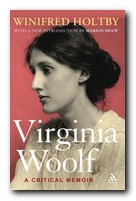critical study – plus personal memoir
Virginia Woolf A Critical Memoir was the first extended study of Virginia Woolf’s work to be written in English. It appeared in 1936, whilst Woolf was still alive, shortly after the publication of her last major work, The Waves. The author Winifred Holtby was herself a novelist (best known for South Riding) a journalist, a radical feminist, and lifelong friend of Vera Britten, who wrote about their relationship in Testament of Friendship.
 Holtby takes what at the time was a fairly conventional approach to literary criticism, which was to read what was known of the author’s biography into the fiction as a way of explaining it. Thus the parent figures in both The Voyage Out and To the Lighthouse are assumed to be portraits of Woolf’s own mother and father; and the recurrence of sea imagery in her work is seen as simply a reflection of her childhood holidays in Cornwall. There’s a certain amount of truth in this approach, but fortunately it does not hinder her exploration of deeper issues.
Holtby takes what at the time was a fairly conventional approach to literary criticism, which was to read what was known of the author’s biography into the fiction as a way of explaining it. Thus the parent figures in both The Voyage Out and To the Lighthouse are assumed to be portraits of Woolf’s own mother and father; and the recurrence of sea imagery in her work is seen as simply a reflection of her childhood holidays in Cornwall. There’s a certain amount of truth in this approach, but fortunately it does not hinder her exploration of deeper issues.
In fact the surprising thing – which makes this study so readable – is that Holtby had already identified all Woolf’s main themes and innovations, even though she was writing at the same time as some of the work was still appearing.
She discusses the main works – summarising the story, commenting on ‘well-rounded’ characters, and identifying the ‘moments of being’ for which Woolf is now famous. She also relies on huge chunks of quotations from the text, and is often so carried away with enthusiasm that her own commentary blends into Woolf’s narratives in a way which sometimes makes it difficult to see where one ends and the other begins.
Night and Day is seen in comparison with Jane Austen and judged to be the lesser for it – but for reasons which Holtby sees as political. She rightly identifies the short experimental fictions A Haunted House, Monday or Tuesday, and A String Quartet as works marking a major breakthrough in Woolf’s technique, and she offers a stunningly insightful reading of this transition.
It’s occasionally surprising to remember that she had met Virginia Woolf, and was writing at a time when both of them were commercially successful authors. Holtby’s prose style is eloquent and fluid, and she becomes almost rhapsodic when describing Woolf’s achievement as a literary critic:
She has, moreover, an almost perfect taste. Few critics have ever been more alert to detect humbug, the spurious, the second rate; few have been more generously and freely appreciative of real merit, even if it appears under strange disguises. Taste for her is a natural gift, never blunted by the adolescent ignorance, the commercial pressure, the confusion of aim and distractions of fashion, to which so many critical judgements are subjected.
She deals with Mrs Dalloway and To the Lighthouse in the same chapter, largely it seems on the grounds that they deal with the issue of Time in complementary ways.
She ends, fortunately for us, with The Waves, for not long after having written it Winifred Holtby died at the age of only thirty-seven. This is a remarkable book for its time, and still eminently readable now – seventy years after it first appeared.
© Roy Johnson 2007
Winifred Holtby, Virginia Woolf: A Critical Memoir, London: Continuum, 2007, pp.206, ISBN 0826494439
More on Virginia Woolf
Virginia Woolf – web links
Virginia Woolf – greatest works
Virginia Woolf – criticism
More on the Bloomsbury Group